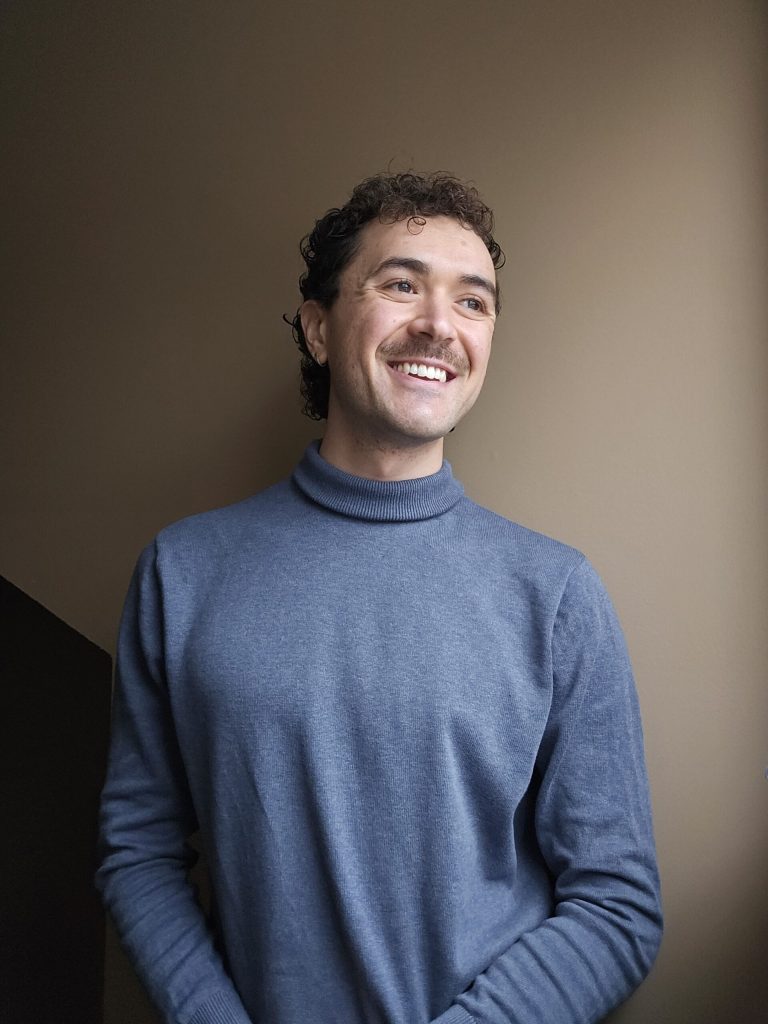Raising Stakes: Jeff McGilton Talks Kingston WritersFest

Participating and playing in this year’s WritersFest is Jeff McGilton, a multi-faceted artist who Kingston has the pleasure of engaging this week. He and Mariah (Mo) Horner will be facilitating a workshop in the September festival titled Participatory Play. Earlier this year, Horner and Dr. Jenn Stephenson published Play: Dramaturgies of Participation and the workshop—a TeensWrite Studio event—will guide teens through concepts in the book, mainly focusing on participatory theatre. As illustrator of the book and a theatre practitioner himself, McGilton was recruited to co-facilitate the workshop, and he’s feeling excited for a return to the Limestone City from his home base of Toronto.
After briefly being introduced to McGilton last summer at a Kick & Push show, I had the pleasure of working with him for three and a half months this summer through Arts in the Parks. Having about two weeks of Jeff-less banter, I sat down for our interview eager to be enveloped once more by his passion for and commitment to the arts.
This interview has been edited for length and clarity.
After taking a few minutes to settle into the Zoom call—working in parks together all summer made it very odd to suddenly have a screen between our chatter—McGilton kicked off our discussion by telling me about Participatory Play. “The workshop itself is going to be looking at participatory theatre… as well as techniques that people use to create a body of work or specific piece. We wanted to make sure that the workshop itself would have people trying things out, would have people getting on their feet, especially since we’re going to be working with young people…
“We went through the book and we found different shows that would showcase different sorts of participatory theatre. For example, Monday Nights [created by 6th Man Collective] is one that we’re going to be talking about. This is one that happens in a basketball court… After dividing into four different teams, audience members meet their team captains and cheer as they complete drills and mini games of basketball. Each captain has a microphone, and through wireless headsets the audience is able to hear their self-talk, worries, and concepts of being a good player. After these intimate demonstrations, the audience/teammates are invited to play for their team in a series of small games with their captains… The games could not happen without their participation, and as they play, they consider their actions in real time.”
While thinking about working with teens, McGilton reflected on his introduction to participatory theatre. “For me, it came about in seeing more locally-sourced or locally-engaged [theatre] where there was less of a wall between the audience and performers. Another thing that I went to growing up a lot, which probably fuelled this fire for participatory theatre, was pantomimes. My family religiously at Christmas time would go to the Capitol Theatre in Port Hope and we would see the pantomimes that they would put on. And that was always really magical because you had these performers who were talking directly to the audience. It was really up to you to tell them about who was onstage; what was coming behind them. There were specific prompts so if something was said, you would shout it back.”
I commented to Jeff about how in traditional-style theatre there’s a set of rules, whether unspoken or clearly stated, that audiences are requested to follow. Participatory theatre seems to be flipping this concept on its head. Now, nothing is without its own rules but, as McGilton puts it, participatory theatre has “a different set of rules about the space; it creates for more allowance of what audience members can and can’t do.”
Included in this are in-depth considerations of and for audience members. “This is theatre that creates meaning based off of the interactions and contributions from audience members and audience participants. During the planning phase, maybe even before the planning phase… you’re already considering the role of the audience. And I would say in that, you are considering—well you should be considering—who your audience is, who’s coming in, maybe what their socioeconomic background is, what their accessibility needs are, how they’re going to engage with the content… I say that hopefully.”
Although hopeful about theatre practitioners considering many elements of how to create participatory theatre, McGilton understands that in being less optimistic, there are exploitative practitioners out there. “There’s definitely some performances, and some that are mentioned in the book, Play: Dramaturgies of Participation, in which… the emotional capacity of the audience is not fully considered, and people are actually put through something that could have been avoided at the expense of trying to have some kind of effect on them.”
Despite these potential cons, participatory theatre can offer a greater takeaway for audiences. “I think there’s also opportunity for really powerful moments of change in people that you wouldn’t be able to access in other art forms. Through participating and through having stakes in a performance, there’s greater opportunity for change within you.”
Particularly when working with Horner, McGilton becomes excited about the possibilities. “Mo is lovely to collaborate with… She’s going to have a lot of cool things to share with the young people, and is going to be excited to stoke the coals and have conversations. She’s also, I think, incredibly generous in the way that she leads and lets people’s voices be heard.”
The workshop is certainly going to be a generous and collaborative experience for all its participants. Feeling rejuvenated and reflective after only a 30-minute Zoom call of speaking about its content, I too feel excited for the young folks to engage with the Participatory Play.
Jeff McGilton is a queer creator, collaborator, and facilitator with a passion for community-based arts. Trained in applied theatre, Jeff acknowledges the power that art can have in the bridging of gaps and building of communities. He is a firm believer in the importance of access to art for all and has worked in multiple settings to facilitate that process.
Kingston Writersfest begins today, September 25th, 2024, and Participatory Play runs tomorrow, September 26th, 2024. Find more information here.
